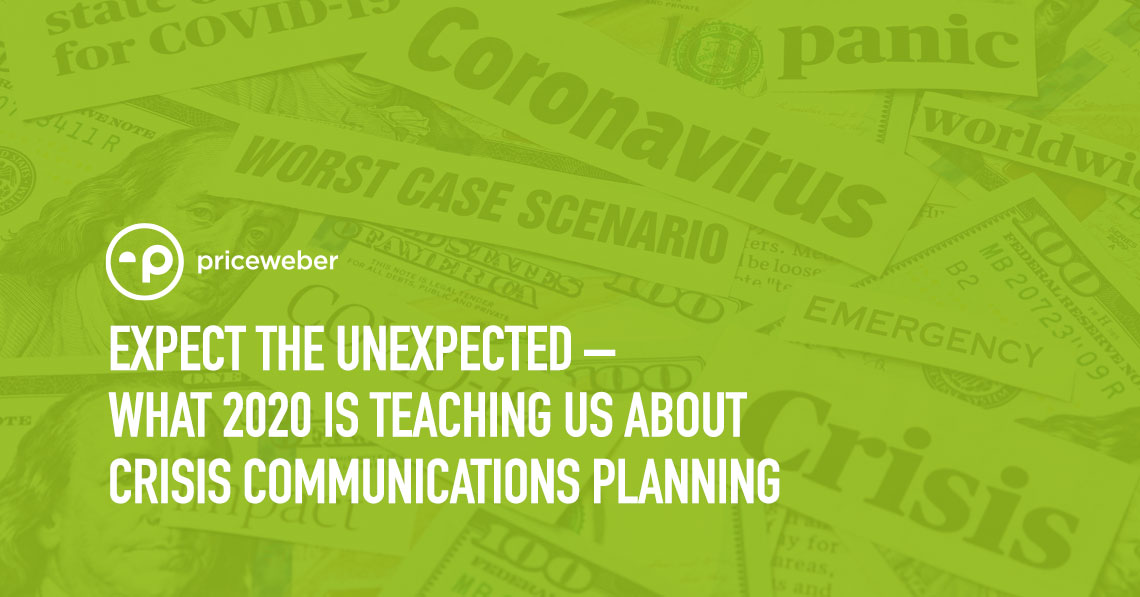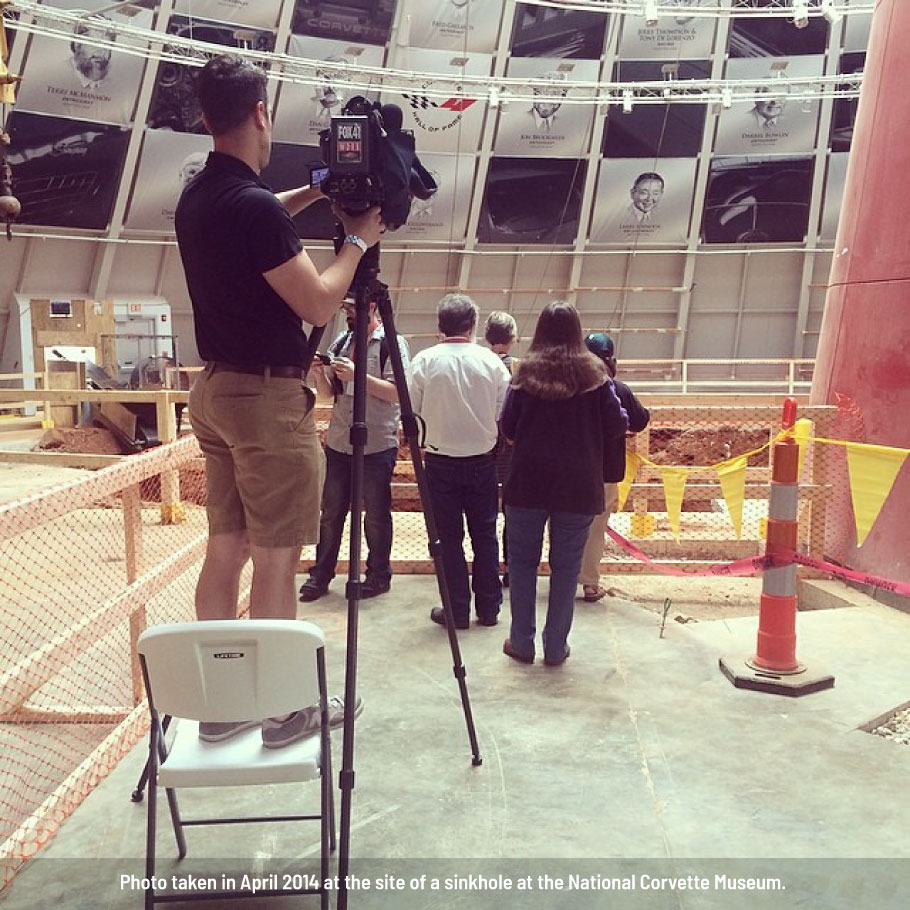For a long time to come, 2020 will be known as the year that changed everything – the way we live, socialize, shop, travel and work. You name it and it was impacted this year. That includes crisis communications plans that were already in place. Many businesses have formal plans that help them prepare for their worst-case scenarios, but who was ready for a pandemic that affected how businesses operate, or for national protests as a result of racial injustice that held businesses accountable to be transparent about where they stood in the Black Lives Matter movement? The answer: absolutely no one.
This year has put many public relations professionals to the test, seeing just how quickly they can think on their feet and react. While we weren’t prepared for this scenario we are currently in, this year has reiterated to many companies, that while you can’t plan for every potential scenario, an overall crisis communications plan is needed and very important in helping your business handle an emergency situation.
Crisis Communications 101
You shouldn’t be waiting for a crisis to begin discussing crisis communications. Would you wait for your car to run out of gas before you decided to fill it up? No. You think ahead and hit the nearest gas station before you run out. That’s what all businesses should be doing, and thanks to this pandemic, probably are doing right now: thinking ahead to the next potential crisis and preparing.
There should always be a plan in place for how your business approaches a crisis, and then, if you are thrown into a scenario you weren’t prepared for, like a pandemic, at least you have a running head start and a pre-existing plan to work around, rather than starting from square one with no plans in place. Plan for what you can realistically plan for, so that you have the tools and structure already in place to tackle any new crisis that may be thrown at you. The worst thing you can do is be unprepared.
In 2019, one of our clients, the Louisville Zoo, experienced a major crisis when there was a roof collapse in a cave system under the Zoo. The news was picked up internationally, and all eyes were on the Zoo and this crisis situation. While there wasn’t a pre-plan in advance for a potential roof collapse under the Zoo, there were plenty of other scenarios that the Zoo had prepared for over the years, so that when this crisis occurred, they were ready to quickly meet as a team, discuss the situation and begin executing a plan without wasting any time at all.
What did that entail? Like other potential crisis situations, it included first stopping all social media content for the day that was previously scheduled – posts spotlighting animals and encouraging visitors to come to the Zoo. Had this content gone out during the crisis, it would have made matters worse, and the Zoo recognized and stopped this from happening. The plan also included keeping Zoo fans and followers informed on social media daily and also being transparent with local media and providing them with daily updates. Zoo leaders did a great job taking a crisis they had never experienced before and quickly reacting to it and keeping the community well-informed. A lot of this came down to being prepared with crisis communications planning.
Turning a Negative into a Positive
While for some, a crisis situation may result in a company or leader refraining from saying much or laying low to avoid being in the public eye, other companies have embraced crisis situations to turn a bad scenario into a positive earned media story.
One of my favorite situations where this happened was the KFC ‘FCK’ campaign. What did KFC do when it encountered a chicken shortage – the main food it offers – in restaurants in the United Kingdom? It took out an ad to apologize to the public and changed the KFC to ‘FCK’ on a photo of an empty bucket. They had a crisis on their hands, and rather than avoiding talking about it, they embraced the crisis, poked fun at themselves and turned it into a campaign that went viral for all the right reasons. Pure gold.
And they just did it again. During the middle of this global pandemic, KFC saw where their iconic ‘finger lickin’ good’ slogan wasn’t the best phrase to promote at this time, especially when faced with the seriousness of this virus. Like any good company always on the lookout for potential crisis situations, they headed this off before it ever became an actual situation and turned it into a clever campaign, placing an ad on YouTube where they blurred out the slogan, acknowledging it wasn’t the right time for the slogan. It had everyone talking and resulted in plenty of positive earned media coverage.
In 2014, when a sinkhole opened up under the National Corvette Museum, resulting in eight corvettes falling in, museum leaders had a true crisis on their hands. How do you handle a situation where a sinkhole swallowed vintage cars that were on display? They were transparent with the community and media, they saw interest from people across the world who wanted to see the destruction, and they turned it into an exhibit. They took a worst-case scenario and turned it into a tourist attraction that continues to do well. And should this happen again, I would be pretty confident to bet that museum officials now have a plan in place for how to handle this type of crisis moving forward.
How to Plan for the Unexpected
So, as a company, how do you plan for the unexpected? What should you do to get a crisis communications plan in place?
First, make sure you can answer the following questions:
Who Are Key Decision Makers?
During a crisis, what is your key messaging and who plays a critical role in drafting the internal and external messaging for your company? Is this your CEO? Your HR or Communications Director? Think through who needs to be quickly drafting this messaging, which is crucial during a crisis.
What Does the Communications Workflow Look Like?
Is there a plan in place of how you will alert employees and key stakeholders of the crisis? If this is a large enough crisis, what is your plan for social media and media as well? When a crisis is underway, you may feel the need to say nothing at all, but when it is a crisis that impacts a large number of people or is important to the community, the longer you wait to be transparent with key stakeholders, internal team members or community members, the more untrustworthy your business can appear. During a crisis situation, it’s important to keep everyone informed in real time and have a strategy in place for how to respond, including on social media.
How Will You Monitor the Situation?
Speaking of social media, who is the team member monitoring your social media channels and responding to potential questions/comments during a crisis? If there is a crisis underway, a team member should always be monitoring your pages and prepared to respond with key talking points or messaging. Too often, businesses are just thinking of how to react to media outlets during a crisis situation, but your social media channels are just as important during this time.
Who is the Spokesperson?
Who is your spokesperson, and have they been media trained to be ready for all potential questions that may be thrown at them? You do not want to put someone on camera or in front of a reporter who isn’t prepared to answer all questions, even the questions you don’t think media will ask you. Be prepared for everything, and whoever will be speaking to media, ensure they are well-prepared, remain calm and anticipate all questions that may be thrown at them.
Now that you have your plan in place for who will help you through this crisis, start thinking of all potential crisis situations that your business may experience, including a pandemic. As a team, put a plan in place for all potential situations and walk through it together. Make sure your team members who will be involved in this plan are well-informed and confident in the plan, and should a crisis happen, this team is ready to handle any situation that may be thrown at them.
If 2020 has taught us anything, it is to expect the unexpected. It’s not a matter of *if* your company will experience a crisis. It’s a matter of *when* and just how prepared you are to handle it when that time comes. Take the necessary steps now to ensure you have a plan in place should you ever need to use it.
Questions?
If your team is interested in assistance with crisis communications planning or media training, we’d love to talk. Give us a call at 502-499-4209, or contact us here.
About the Author
Tamara Davis is the Director of Public Relations at PriceWeber. She manages a team that oversees all social media and public relations for PriceWeber and our clients. Tamara spent over a decade developing her formidable storytelling skills as a journalist and news anchor, for which she won numerous awards throughout her career, including the prestigious Edward R. Murrow Award.



